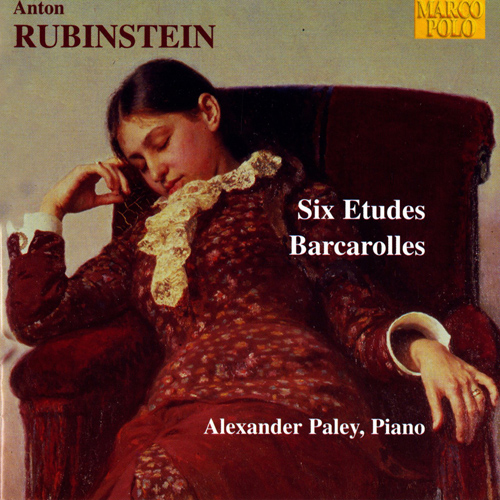RUBINSTEIN: Piano Works
Tracklist
Chiavacci, Vincenz - Lyricist
Vienna Mannergesang-Verein (Choir)
Slovak Radio Symphony Orchestra (Orchestra)
Vienna Mannergesang-Verein (Choir)
Slovak Radio Symphony Orchestra (Orchestra)
Strauss Festival Orchestra (Orchestra)
Strauss Festival Orchestra (Orchestra)
Slovak State Philharmonic Orchestra, Košice (Orchestra)
Slovak State Philharmonic Orchestra, Košice (Orchestra)
ORF Vienna Radio Symphony Orchestra (Orchestra)
ORF Vienna Radio Symphony Orchestra (Orchestra)
Wildner, Johannes (Conductor)
Slovak Radio Symphony Orchestra (Orchestra)
Wildner, Johannes (Conductor)
Slovak Radio Symphony Orchestra (Orchestra)
Slovak State Philharmonic Orchestra, Košice (Orchestra)
Slovak State Philharmonic Orchestra, Košice (Orchestra)
Slovak Radio Symphony Orchestra (Orchestra)
Slovak Radio Symphony Orchestra (Orchestra)
Slovak Radio Symphony Orchestra (Orchestra)
Slovak Radio Symphony Orchestra (Orchestra)
Dohnanyi, Oliver (Conductor)
Dohnanyi, Oliver (Conductor)
Slovak State Philharmonic Orchestra, Košice (Orchestra)
Slovak State Philharmonic Orchestra, Košice (Orchestra)
Polish State Philharmonic Orchestra, Katowice (Orchestra)
Polish State Philharmonic Orchestra, Katowice (Orchestra)
Lenard, Ondrej (Conductor)
Lenard, Ondrej (Conductor)

Born in Kishinev, in Moldavia, in 1956, Alexander Paley had his first musical training in his native town, where he attended the School of Music, giving his first concert when he was thirteen and three years later winning the Moldavian National Music Competition.
He later studied at the Moscow Conservatory, where his teachers included Bella Davidovich and Vera Gornstayeva, completing his course there in 1981. His subsequent concert career took him to major musical centres throughout Eastern Europe, and in France, Belgium, Italy, Germany and Spain, with distinguished awards in important international competitions. In 1988 he emigrated to the United States and with a repertoire of some thirty concertos and solo piano works ranging from Scarlatti to Bartok has continued his international career, now winning the highest acclaim also from American critics.

Not to be confused with the great pianist Artur Rubinstein, born in 1887, Anton Rubinstein was an even greater performer in his time and a clear rival to Liszt and other great pianists of the 19th century. He had a marked effect on the development of music in Russia, establishing the first system of professional musical training at a new Conservatory in St Petersburg in 1862. His brother Nikolay set up a similar institution in Moscow. The conservatories were not welcomed by the nationalist composers, who regarded them as a German intrusion (despite the Rubinsteins being Russian, though of German-Jewish extraction). As a composer Anton Rubinstein was prolific, writing, as his brother suggested, enough music for both of them. His very technical facility told against him so that by the time of his death his work was not properly valued by supporters of Russian musical nationalism.
Operas
Rubinstein wrote 17 operas. These are no longer part of general repertoire, but excerpts from the fantastic opera The Demon and the opera Feramors may be heard occasionally in concert extracts.
Orchestral Music
Rubinstein’s orchestral compositions include six symphonies, of which the second, ‘Ocean’, is the best known. He wrote five piano concertos and other works for piano and orchestra, and concertos for both violin and cello.
Chamber Music
As prolific here as in other forms of music, Rubinstein wrote a number of string quartets, three violin sonatas and two cello sonatas in addition to other chamber works. None is often heard, except possibly the Sonata for viola and piano—a useful addition to an otherwise exiguous repertoire for the viola.
Piano Music
Rubinstein, as a leading virtuoso of the piano, wrote quite prolifically for the instrument. Of all the sonatas, suites, serenades and other pieces, the Melody in F remains notorious in its popularity.































